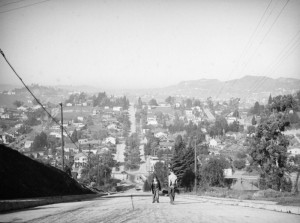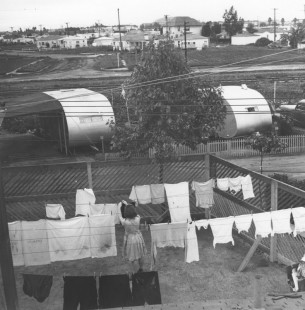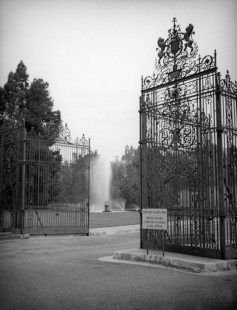The Last Edendale
Phyl M. Noir
On April 10, 2011, Sam Garfield was dying. Even before senile dementia made him crazy she knew he’d write her off like he’d written off Uncle Max over the milk. It took nothing at all for Sam to cut people off. He refused to see her.
She did surface streets with satellite radio turned up as high as she could stand it but could not prevent herself from thinking about the neurasthenic Maria Wyeth in Joan Didion’s Play It As It Lays who hears about her mother’s death and drives the freeways. Cyd was actually remembering the movie with Tuesday Weld and the actress’s little white hands steering through diffused sunlight.
She parked in front of the old house on Chapman Avenue. A man in his thirties came out of the house. He looked at her sitting in the car. Read more
Next To Last Edendale: The House On Moreno Drive In Silver Lake
By Phyl M. Noir
The whirring blades of a police helicopter broke into the blue hour.
“That day,” he said putting his hands on his wife’s shoulders, “you brought tomatoes to my mother. Minda took you out on the balcony – what did she say to you?”
“She said that if I came back from New York for you that I was mistaken but I hadn’t come for you.”
“You came for me.”
“Perhaps I did,” she said but it wasn’t true.
A broad light beamed from the helicopter and illuminated their yard. Their dog ran from door to door, barking and trying to get out.
“Hey!” Bruno yelled at the dog.
“It’s a police state. Only the police organize the city,” Celia said. “It’s a pity.”
She opened the gate and stood in the beam of light and waved and smiled. She put up her hands with the first fingers meeting the thumbs to signal “OK.” The dog rushed out through the partially closed gate. He barked.
“Hey, moronic young men and women up there! Hey! You are idiots!” She yelled at the helicopter. The dog showed he agreed with her by barking louder.
The helicopter light went off. It headed across the sky in the direction of Frogtown.
“I’m going to mass. Do you need me to stay?”
Bruno stood at the stovetop looking at the burners. “No.” He laughed.
“Why are you laughing?”
“Do you ever want to turn the knob to the left to turn the burner off?”
“Never.”
“I keep doing that.”
“I know.”
“I’ve fried five tea kettles and I was going to do it again. I took the whistle off. They should make tea kettles that don’t work unless the whistle is on.” Read more
Why Edendale
Phyl M. Noir
Let me step into these stories to explain what I meant to write before they end. Besides, the ending is under construction.
I am from Edendale. I examine it from the inside.
Los Angeles lacks the human presence on the streets that other large cities have. It is sometimes seems as if this city exists without people. It is a city built for the profit in real estate development
This city is at the end of America: socially fragmented and spatially dispersed. The automobile allowed development in previously inaccessible areas, and the city and state subsidized roads and freeways instead of a good public transportation system. See, Robert Fogelson, Fragmented Metropolis (1967).
One of Alison Lurie’s protagonists in The Nowhere City (1965) defines Los Angeles as the center of a revolving concrete donut on top of a store on Sepulveda: “That big empty hole going around and around up in the air … that’s what this city is! … a great big advertisement for nothing.” Lurie wasn’t from here. She was from Chicago and grew up in White Plains, and her perceptions are an outsider’s. Read more
Edendale: Chapter 15
WEST FAT HILL
By Phyl M. Noir
After the city tore down all the old mansions, the stores and the apartment buildings on Bunker Hill in 1960, Joy moved to a house in Cerro Gordo, which means Fat Hill in Spanish. From her hill she saw Bunker Hill, which was bare for many years, and – after about a decade — the skyscrapers that replaced the bare hill. Read more
Edendale, Chapter 14
Over the Grapevine
By Phyl M. Noir
Hiro smelled water and pines. Small boats gathered next to houses on the edge of Clearlake. Beyond them was the expanse of the lake — larger in his imagination than it really was because of the fog. He parked across the street from a wood house set on posts in the water.
Cyd Bissell wore a turquoise dress. She came out of the house through a screen door, turned on the porch light, looked down the road for a moment and went back inside the house. She hadn’t looked across the street: the fog had softened the sound of his van’s engine when he arrived.
Hiro had a limp from the polio he had when he was four years old. It took him a few minutes to swing his legs out of the van and slide his feet to the pavement. He pulled the package from the seat next to him and tucked it under his arm. He walked down the wooden ramp, stood on the porch in front of the door and waited. Read more
Edendale, Chapter 13

Malcolm Lowry, author of "Under The Volcano," was in Curaco about the time that Ronald and Marnix were there. Did the great author's close proximity to the young Ronald set him on his inevitable path under the volcano growing up in the Silverlake Hills?
THIRSTY PARADISE
By Phyl M. Noir
INT. COUNTRY HOUSE IN THE NETHERLANDS: DAY
A picture window in the living room reveals a descending garden, and the garden contains the bare branches of mature trees, bare rose bushes and perennial plants. There is snow on the ground. Only sky is seen above the trees. The sky is gray with clouds.
The interior’s design is Bauhaus but some of the furniture and the oil paintings were created in earlier centuries. There is a large painting in a carved gold frame of a blond woman wearing eighteenth century clothing, a large cupboard elaborately carved with vines, birds and mice, tables with feet shaped like lions’ claws, and a Balinese trunk made of dark wood. Read more
Edendale: Chapter 12
North Alvarado Street on Red Hill
By Phyl M. Noir
Wind rattled the windows of my house and pea sized hail hit the windows and struck the chimes hanging from one of the big eucalyptus trees. The marmalade-colored cat sat on the stairs to the backyard inhaling the scents in her venue: pepper, eucalyptus, ladybugs, succulents with a little water lying in their scooped bellies, skunk, and lemon. The wind blew the cat’s fur into an aureole.
I opened the windows and breathed salty air. Wind drew struggling gulls in a spiral towards rain clouds.
Below the clouds shone the gold-leaf dome of the Ukrainian Orthodox Church. Beyond the dome was Bohemian Hill — one of the Silver Lake hills — and beyond it white letters spelling Hollywood rose above chaparral growing on one of the smaller of the Santa Monica Mountains. Read more
Edendale: Chapter 11
THE APARTMENT HOUSE ON ROWENA
By Phyl M. Noir
On a Tuesday in January 1996, Jade Yee sat behind her desk in the John Steinbeck public library in Salinas.
It was cold outside. It was always cold outside in Salinas where it was often said you had your winter coat and you had your summer coat. The rooms inside of the library were too warm. The air was too dry.
A man walked up to her desk. Jade recognized saw him as he used to be – Ralph, a small slight boy with hair worn in an exaggerated pompadour like Jim Carrey’s in Ace Ventura Pet Detective standing on the varnished blond wood floor of the music room in the Yates house a violin tucked under his chin. She saw the music score to Chopin’s Polonaise left open on the piano stand. She saw herself at thirteen sitting on the piano bench although that image was an import into her memory from a photograph her mother had taken: straight Chinese hair on each side of a perfectly straight part, a white nylon blouse with a little black velvet tie, and her hands poised delicately over the keyboard. She remembered seeing the observatory on one of the Griffith Park peaks through the window behind the piano. The park was not always on fire but she remembered Ralph’s face tinted red and the flames in the windows and their teacher Frances’ powerful bronze hands on the orangeade ivory keys. Read more
Edendale: Chapter 10
Glassell Park
Ansel Adams, Courtesy Los Angeles Public Library
By Phyl M. Noir
Bruno got a job as an engineer’s assistant for the city and rented a house in Glassell Park. Malcolm came to live with him and Minda. Bruno thought implausibly: with time Malcolm was going to be all right.
Bruno had a job before this one. He had taken care of schizophrenics and worked with them at a car repair shop because Malcolm went to the same doctor as they did. That hadn’t worked. Dr. Hilarius came by the repair shop and punched the schizophrenics in the face to make them better. Most of the schizophrenics ran squealing out of the back of the shop into the alley and didn’t finish their work. Malcolm, however, waited behind the door until the others had gone and leapt on Hilarius’s back and punched him in the head. The doctor ran out the door covering his head with his arms. Read more
Edendale: Chapter 9
Toonerville At The End Of The Civilized World
The photo is by L.A. Times photographer Herman Schultheis taken around 1940.
Courtesy Los Angeles Times
By Phyl M. Noir
Jade Yee was exhilarated and powerful. She flew over the house roofs in Toonerville. The red Tooner Ville electric train traveled beneath her through pine forests towards the San Gabriel Mountains. It went over Fletcher Drive and onto Bliss.
She flew over the Forest Lawn wall and watched a military funeral. She heard the guns salute and understood at last how it was that people died: you shot them. She saw oleanders bright with raspberry flowers bending in sunlight. Read more










